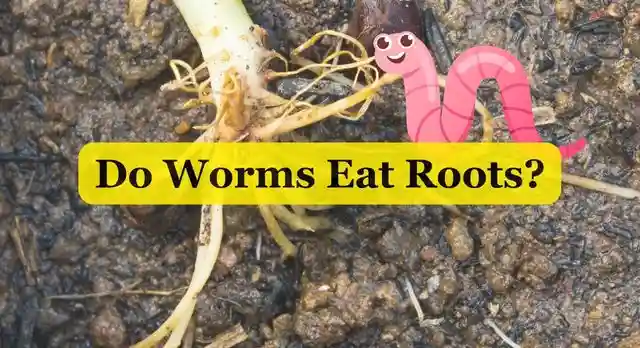Do Worms Eat Roots? Unveiling the Truth
Worms play a vital role in the ecosystem, contributing to soil health and fertility. They are often praised for their ability to break down organic matter and improve soil structure. However, there is a common misconception that worms eat plant roots, causing damage to crops and gardens. In this informative guide, we will explore the truth behind the question, “Do worms eat roots?” We will delve into the feeding habits of worms, their impact on plants, and provide insights into maintaining a harmonious balance between worms and your garden’s roots.

Do Worms Eat Roots? Debunking the Myth
The short answer is no, worms do not eat roots as their primary food source. Earthworms, the most common type of worms found in gardens, feed on decaying organic matter, such as dead leaves and plant debris. They consume materials like fallen leaves, decomposing grass, and other organic substances found on or near the soil surface.
Worms possess a muscular organ called a gizzard that helps grind and break down organic matter, preparing it for decomposition. This process, known as vermicomposting, helps convert organic waste into nutrient-rich castings, or worm manure, which improves soil fertility.
Protecting Roots from Worm Damage
While worms do not eat roots, certain conditions can lead to incidental root damage. Here are a few considerations to protect plant roots in your garden:
Plant Selection: Choose plant varieties that are well-suited to your soil type, climate, and garden conditions. Strong and healthy plants are more resilient to any minor root disturbances caused by worms.
Maintain Adequate Soil Moisture: Keep the soil evenly moist, as excessively dry or waterlogged conditions can stress plant roots and make them more susceptible to damage.
Provide Organic Matter: Ensure a continuous supply of organic matter like compost or mulch. This will provide alternative food sources for worms, reducing the likelihood of them seeking roots for nutrition.
Practice Crop Rotation: Rotate crops annually to prevent the buildup of pests or diseases in the soil. This can help maintain healthy root systems and minimize any potential root damage caused by pests or pathogens.
Monitor and Take Action: Regularly inspect your garden for signs of root damage or pests. If you notice any issues, take appropriate measures to address the underlying problem.
Read More About – What does earthworm eat in their diet?
Key Takeaway
Worms do not eat roots as their primary food source. Instead, they contribute to the overall health of plant roots and the soil ecosystem by enhancing soil structure, promoting nutrient cycling, stimulating microbial activity, and improving water regulation. Understanding the role of worms in the garden allows us to appreciate their positive impact and take necessary steps to protect and nurture our plant roots. By creating a harmonious balance between worms and plants, we can cultivate thriving gardens with healthy, vibrant root systems.
Related Guide – Do Worms Eat Algae? Unraveling the Mystery
Do worms eat live plant roots?
No, worms generally do not eat live plant roots. They primarily feed on decaying organic matter like dead leaves and plant debris.
Will worms eat my root vegetables?
Worms are unlikely to eat your root vegetables. They prefer to consume organic matter that is already decomposing rather than fresh produce. So, you don’t need to worry about worms damaging your root vegetables in the garden.
Do earthworms damage roots?
No, earthworms do not damage roots. In fact, earthworms can be beneficial to roots. As they move through the soil, they create channels and burrows that help improve soil structure and allow air and water to penetrate deeper. This promotes root growth and provides roots with better access to nutrients and moisture. Earthworms also aid in the decomposition of organic matter, which can enrich the soil and benefit root health. Overall, earthworms play a positive role in soil ecosystems and do not cause damage to roots.
